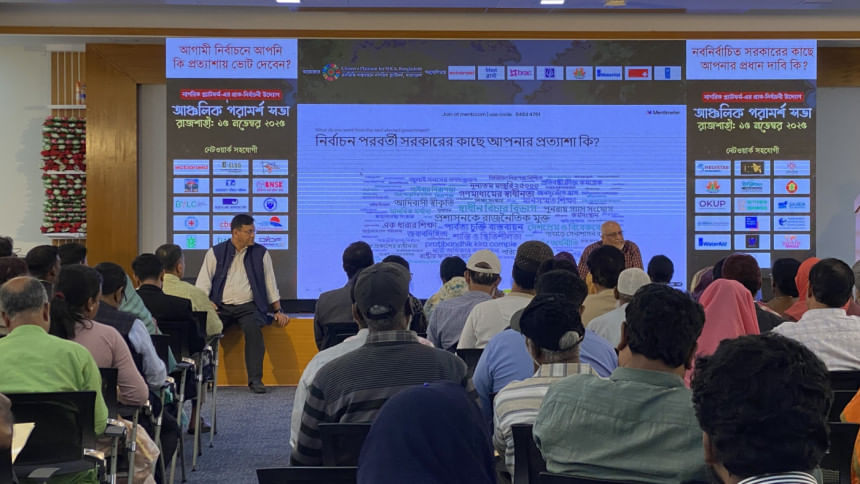'Major security risks persist under interim govt ahead of polls'

Speakers at a pre-election consultation in Rajshahi today said they still face major security risks under the interim government.The consultation, organised by Citizen's Platform for SDGs, Bangladesh, was held at the BRAC Learning Centre with over a hundred participants, including academics, researchers, political and social activists, rights workers, development professionals, journalists and youths.Citizen's Platform convener Debapriya Bhattacharya said participants unanimously identified secu...
Speakers at a pre-election consultation in Rajshahi today said they still face major security risks under the interim government.
The consultation, organised by Citizen's Platform for SDGs, Bangladesh, was held at the BRAC Learning Centre with over a hundred participants, including academics, researchers, political and social activists, rights workers, development professionals, journalists and youths.
Citizen's Platform convener Debapriya Bhattacharya said participants unanimously identified security as the most critical issue ahead of the national polls. He said the matter extended beyond economic stability to social, cultural and business safety. Strengthening security, many felt, was essential for a fair election.
He added that participants clearly called for a reversal of the entrenched political culture.
"Earlier, leaders spoke and the public only listened. People now want that dynamic to change," he said.
Mohanpur Government College teacher Asad Ali said there is a fear of mob violence happening anytime. "If you say or post anything online that displeases someone, there is a strong chance of coming under mob attack."
Mostafa Sarker Bijli, founding president of Bachar Asha Sangskritik Sangathan, alleged that a group was harassing them for performing at cultural events.
"We are artists. We perform for a living. But now a vested quarter is targeting us, accusing us of siding with the fascist regime," he said.
Sultana Ahmed Sagarika of Diner Alo Hijra Sangha said the interim government had taken no visible steps for Hijra communities.
"Even our Ashrayan Project houses were vandalised, looted, and the land grabbed in broad daylight," she said, adding that police and administration officials took no action despite repeated complaints.
Amin Ahmed, a university student, said villagers in his locality are guarding their neighbourhoods at night due to weak law enforcement and rising robberies.
Ethnic minority leader Raj Kumar Shao said evictions had disproportionately affected their communities during the interim government's tenure. "Ethnic families, including the Kol community in Godagari, were evicted unlawfully while police stayed silent."
Speakers also highlighted the deepening groundwater crisis in Barind, limited agro-based industries, lack of gas connections, food insecurity, and weaknesses in healthcare, education, governance and social protection.
Concerns were also raised about controlling election expenditure, regulating social media misuse, and ensuring competent electoral nominations.
Participants expressed a desire for elections that bring genuinely representative leaders to power and stressed that unless campaign spending is reduced, curbing corruption would remain extremely difficult, he added.
They also called for annual accountability, arguing that each elected representative should be required to present a yearly report on their responsibilities.